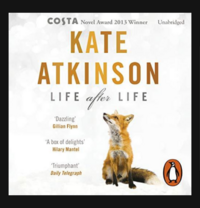Take a photo of a barcode or cover
mysterious
reflective
medium-paced
Plot or Character Driven:
A mix
Strong character development:
Yes
Loveable characters:
No
Diverse cast of characters:
No
Flaws of characters a main focus:
No
“Chapter after Chapter” more like it. Imagine a snake swallowing its own tail and you’ll have the plot of this book. In theory I love to see the idea of reliving your life explored in books. In practice this one dragged.
There was too much ambiguity about if and when Ursula figures out what is happening to her and how to use it to her advantage. For that matter, why didn’t she choose to use it more to her advantage along the lines of Replay? Too many questions and not enough answers for my taste.
There was too much ambiguity about if and when Ursula figures out what is happening to her and how to use it to her advantage. For that matter, why didn’t she choose to use it more to her advantage along the lines of Replay? Too many questions and not enough answers for my taste.
Expertly written and the dialogue & thoughts of the characters were authentic in terms of class, repression & etiquette, but I didn't particularly enjoy it.
1) Prologue sets up the conceit (parallel realities/universes) but the if you could go back and kill Hitler would you? conundrum is left really unsatisfyingly late in the novel. You know it's coming and the frustration of that wait erodes ones enjoyment
2) The main character dies and lives alternative forked realities of what if she'd survived... But I didn't really care, because the deaths didn't hurt enough. You knew she was still alive in another universe
3) Having said that, the description of mangled body after mangled body being pulled from the rubble during the London Blitz was actually too much, too overwhelming (compensation for point 2 above?) Reminded me of Bolano's "2666" and I found the remorseless death there unpalatable as well. You just begin to get immune to it and that can't be the point surely? Less is more.
4) The conceit is not modulated all that well. She dies a lot in her early life, but then the device is almost in abeyance for a large chunk of the book, threatening that the whole novel was actually something else, until the device is resorted to once again. If the point of the book was about the horrors of World War 2 and the resistance shown by the British, the conceit is too transparently a conceit and not organically woven into the fabric of the narrative.
5) The final vertiginous section which sort of knits together aspects of each of the parallel realities at breakneck speed, (not sure that works fully successfully), but what's worse is that it's suggested the conceit represents a dream/deja vu state, or links up again its theme of Buddhist reincarnation (except that's never into the same body). This all undermined whatever power the conceit may have had. What was it for - the 'kill Hitler' question? The different lives and shades and decisions made by the protag? Or a genuine parallel universe thing, in which case which of the realities was more important than the rest - presumably none of them?
1) Prologue sets up the conceit (parallel realities/universes) but the if you could go back and kill Hitler would you? conundrum is left really unsatisfyingly late in the novel. You know it's coming and the frustration of that wait erodes ones enjoyment
2) The main character dies and lives alternative forked realities of what if she'd survived... But I didn't really care, because the deaths didn't hurt enough. You knew she was still alive in another universe
3) Having said that, the description of mangled body after mangled body being pulled from the rubble during the London Blitz was actually too much, too overwhelming (compensation for point 2 above?) Reminded me of Bolano's "2666" and I found the remorseless death there unpalatable as well. You just begin to get immune to it and that can't be the point surely? Less is more.
4) The conceit is not modulated all that well. She dies a lot in her early life, but then the device is almost in abeyance for a large chunk of the book, threatening that the whole novel was actually something else, until the device is resorted to once again. If the point of the book was about the horrors of World War 2 and the resistance shown by the British, the conceit is too transparently a conceit and not organically woven into the fabric of the narrative.
5) The final vertiginous section which sort of knits together aspects of each of the parallel realities at breakneck speed, (not sure that works fully successfully), but what's worse is that it's suggested the conceit represents a dream/deja vu state, or links up again its theme of Buddhist reincarnation (except that's never into the same body). This all undermined whatever power the conceit may have had. What was it for - the 'kill Hitler' question? The different lives and shades and decisions made by the protag? Or a genuine parallel universe thing, in which case which of the realities was more important than the rest - presumably none of them?
This book was fascinating as the main character lives successive, parallel lives. Along the way she becomes aware of this and starts to try to make changes and experiment. However, I was never sure why the changes in the last few lives recorded brought about a different ending. And even in the lives with the most satisfactory life choices, won't she just die and the good ending need to be redone again? In the end I was just left with a haunting, mysterious feeling about the whole thing. The details about life during WWII in London are fascinating and appalling. It was also interesting to see how some things changed from life to life and other choices stayed very much the same. My favorite consistency was the main character's closeness with her older sister despite their different life choices. This reminded me very much of my relationship with my younger sister.
dark
emotional
hopeful
mysterious
medium-paced
Plot or Character Driven:
A mix
Strong character development:
Yes
Loveable characters:
Complicated
Diverse cast of characters:
No
Flaws of characters a main focus:
Yes
Concept of this book is a little difficult to get your head around at first, but thoroughly enjoyed this book. Very cleverly written. Loved reading about the different trajectories a life could take,turning on one incident or not.
slow-paced
dark
emotional
mysterious
sad
slow-paced
Plot or Character Driven:
A mix
Strong character development:
Complicated
Loveable characters:
Yes
Diverse cast of characters:
No
Flaws of characters a main focus:
Complicated
Did not finish. I went through a hundred pages of unengaging descriptions of the characters quotidian lives. There is an interesting conceit of reliving the same life, but as I've seen that done interestingly, I didn't feel the need to continue.
While she writes in a very readable style, it doesn't help the book. The premise of learning by ones mistakes and getting a chance to have a "do over" is compelling if done correctly. The book jumps back and never explains if she consciously makes new choices or if it just happens. It's very difficult to keep track of the changes that occur with each reincarnation. There are many other books I could have spent my time reading that would be more enjoyable.





